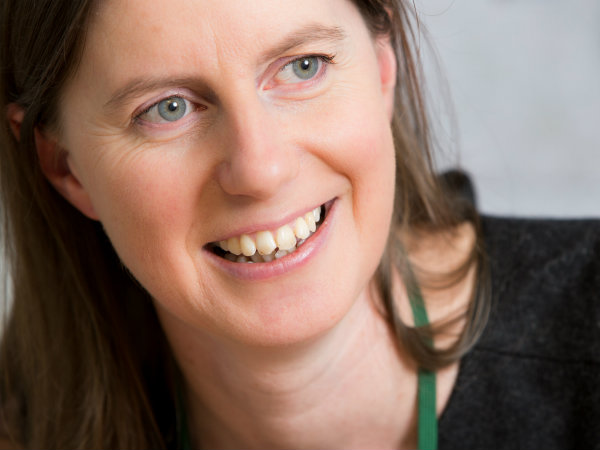“Dave and I were very different characters, but I liked him enormously. We both felt very fiercely about the same things in children’s services.”
Rachael Wardell still remembers the shock and sadness she felt when she heard of Dave Hill’s sudden death earlier this year. They had been colleagues over a number of years at the Association of Directors of Children’s Services.
“He was a leader and champion of the sector in what I always felt was a very beautiful way. Because of that I knew the journey he had begun with Surrey would be one that I could support and there would be no need to dismantle anything or turn things around.”
Nurturing leadership style
Rachael has been described by other leaders as ‘intelligent, brave and kind’. She hesitates to use those words about herself, other than ‘kind’.
“I think I am; I hope I am kind. And I get the feeling that in the past Surrey has not been a place that has been kind to itself or its workforce. My leadership style is more nurturing. I like to listen and help. But I also will be challenging the service because I feel very passionately that we absolutely need to be doing the right thing for families.
I will always stand up for families and I will be asking for evidence that we are helping them. But I will also push back if I think the expectations upon a service are unreasonable and the demands being made on the workforce are unreasonable.”
One of the major challenges that she feels still exists at Surrey is the turnover in the workforce.
Prioritising permanency
“We need to make things right so that people feel enabled to stay. There are a lot of very loyal and long-serving staff members and I take my hat off to them for staying with Surrey through thick and thin. But there is also currently a reliance on agency staff that is not helpful to anybody. Permanency is important to everyone – we know it’s important to children because they tell us they want to get to know their social worker. We know it’s important to social workers because they tell us they feel better able to achieve change when they have good relationships with children and families.”
She talks about getting basic ‘hygiene’ factors for social workers in place such as having a reasonable caseload and being paid enough to feel valued.
“I know we [the leadership team] are looking at the financial encouragements we put in place such as payments for those who convert from agency to permanent and a one-off ‘thank you’ payment to recognise those who have stayed with Surrey.
“We’re looking at things such as transport and housing too. But alongside that we are also looking at culture, supervision and progression. It’s about connecting all these aspects so that when people come here they want to stay because they like what they find.”
Family safeguarding model
She is also enthusiastic about the Family Safeguarding Model that Dave had been committed to implementing in Surrey, having obtained funding from the Department for Education for it.
“It’s a model I’m very familiar with and I like. When I was at West Berkshire we became one of the first adopters of it after Hertfordshire pioneered it.”
But Rachael is under no illusions about the tough road ahead, both nationally and in Surrey.
“We can’t ignore the fact that Covid-19 has set up some long-term challenges for us. The national restrictions designed to keep us all safe have done more harm to some. Families have been isolated from their support networks. The very social contact that often helps families through a crisis has been forbidden. We are already seeing referrals that are more complex and a far wider range of families becoming vulnerable for the first time because of the current circumstances.”
Covid-19 has also financially exposed many local authorities and Rachael expects funding to be a long-term issue for the sector.
Surrey’s strengths
“But one of the strengths that Surrey has is a real corporate commitment and backing for improvement in children’s services. Dave did a lot of work in helping the wider council understand what a core priority children’s services is to any council and how it has to be at the heart of everything they do.”
Surprisingly, Rachael also points to Surrey’s size as a real strength.
“Yes, its size has been the source of some of its woes, but any local authority has its own rhythm. When it’s a bigger authority it is slower. While that means it can be quite hard to turn the ship around, once it has turned and consolidated then those changes do tend to endure and build.”
She also feels the service now has a good culture of encouraging innovation but also adopting other people’s good ideas.
Committment to consistency
“There’s an energy to finding what works, which I like. The senior leadership team are all permanent and stable and that is important because we can’t get stability into the frontline without leadership stability.”
Rachael says she believes Surrey shows every prospect of being able to deliver good services, but she is not necessarily focused on the Ofsted rating when she says that.
“We need to ensure that Surrey is a great place to grow up for ALL of its children, not just some of them.
“I see lots of examples of good practice but now what we need to see is consistency. We need to make sure children and families are central to all our thinking and innovation.
Taking responsibility
“I believe that the greatest change is achieved when we convene around two core principles: that children belong with their families and, if that is not possible, then we hold those children close to us, as close as our own children.
“That might sound nebulous because it’s not hard KPIs or a target Ofsted rating but that’s because those core principles look different for different children. For some it’s being able to go to the same school as their brothers and sisters; for others it’s not having to travel so far for support or being able to access community resources that didn’t exist before. Or it might be that a care leaver is in the right accommodation that helps support them to achieve.
“It’s about us knowing each child, knowing what the right outcome looks like to them and then us taking responsibility to do everything we can to help them achieve that.”
Surrey’s new pay deal
Surrey has created a new financial package to show its commitment to staff. Existing, permanent social work staff, who have been in service for more than two years as of October 2020, will receive a payment of £2,000. This scheme will continue until all existing permanent staff have benefited.
All new social workers, team managers and independent chairs are will be given an extra £6,000, on top of base salaries from October, 2020, in the first 18 months of their employment. The payments are:
- A welcome payment of £1,000
- After six months a further payment of £2,000
- After 18 months another payment of £3,000
Employees who refer a friend to a hard-to-recruit post within the adults’ social care or children’s social care departments could also receive an extra £1,000 payment in return. A referral can be made at any time.
These payments are subject to tax and national insurance deductions and paid pro rata if you are part-time.
If you’re interested in working at Surrey and being part of its improvement journey, then register your interest and check out the job opportunities.




 Facebook
Facebook X
X LinkedIn
LinkedIn Instagram
Instagram